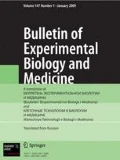Restenosis remains the main complication after percutaneous coronary interventions in patients with coronary heart disease. The causes of its development include, in particular, genetic factors. We studied polymorphic loci of genes encoding endothelin-1 (EDN1 rs5370), endothelin-1 receptor (EDNRA rs5333), endothelin-converting enzyme (ECE1 rs1076669), and endothelial NO synthase (eNOS rs1549758, eNOS rs1799983, and eNOS rs2070244) in the context of in-stent restenosis development. It was found that the analyzed polymorphisms of the endothelin system genes were more significant for patients aged ≥ 65 years, while the polymorphic loci of the endothelial NO synthase gene (eNOS rs1799983 and eNOS rs1549758) were predominantly associated with time of in-stent restenosis. The obtained results can be useful for comprehensive assessment of the restenosis risk factors and the choice of optimal treatment for patients with coronary heart disease before elective surgical intervention.
Similar content being viewed by others
References
Ogorodova LM, Rukin KY, Vintizenko SI, Petrova IV. Association of ENOS gene polymorphisms as a risk factor of coronary in-stent restenosis. Vestn. Ross. Akad. Med. Nauk. 2017;72(2):120-125. doi: https://doi.org/10.15690/vramn796
Ahmed M, Rghigh A. Polymorphism in endothelin-1 gene: an overview. Curr. Clin. Pharmacol. 2016;11(3):191-210. doi: https://doi.org/10.2174/1574884711666160701000900
Hirschi KK, Ingram DA, Yoder MC. Assessing identity, phenotype, and fate of endothelial progenitor cells. Arterioscler. Thromb. Vasc. Biol. 2008;28(9):1584-1595. doi: https://doi.org/10.1161/ATVBAHA.107.155960
Hu H, Jiang C, Li R, Zhao J. Comparison of endothelial celland endothelial progenitor cell-derived exosomes in promoting vascular endothelial cell repair. Int. J. Clin. Exp. Pathol. 2019;12(7):2793-2800.
Levinsson A, Olin A.C, Björck L, Rosengren A, Nyberg F. Nitric oxide synthase (NOS) single nucleotide polymorphisms are associated with coronary heart disease and hypertension in the INTERGENE study. Nitric Oxide. 2014;39:1-7. doi:https://doi.org/10.1016/j.niox.2014.03.164
Oliveira-Paula GH, Lacchini R, Tanus-Santos JE. Clinical and pharmacogenetic impact of endothelial nitric oxide synthase polymorphisms on cardiovascular diseases. Nitric Oxide. 2017;63:39-51. doi:https://doi.org/10.1016/j.niox.2016.08.004
Seremak-Mrozikiewicz A, Barlik M, Perlik M, Kurzawińska G, Drews K. Genetic variability of endothelin-1 system in gestational hypertension and preeclampsia. Ginekol. Pol. 2011;82(5):363-370.
Sprague E, Luo J, Palmaz JC. Static and flow conditions: endothelial cell migration onto metal stent surfaces. J. Long Term Eff. Med. Implants. 2017;27(2-4):97-110. doi: https://doi.org/10.1615/JLongTermEffMedImplants.v27.i2-4.10
Sugawara J, Tomoto T, Noda N, Matsukura S, Tsukagoshi K, Hayashi K, Hieda M, Maeda S. Effects of endothelin-related gene polymorphisms and aerobic exercise habit on age-related arterial stiffening: a 10-yr longitudinal study. J. Appl. Physiol. (1985). 2018;124(2):312-320. doi: https://doi.org/10.1152/japplphysiol.00697.2017
Xu BY, Xiang MX, Wang JA. Endothelial progenitor cells and in-stent restenosis. Curr. Stem Cell Res. Ther. 2015;10(4):364-371. doi: https://doi.org/10.2174/1574888x10666150204150430
Yasuda H, Kamide K, Takiuchi S, Matayoshi T, Hanada H, Kada A, Yang J, Miwa Y, Yoshii M, Horio T, Yoshihara F, Nakamura S, Nakahama H, Tei C, Miyata T, Kawano Y. Association of single nucleotide polymorphisms in endothelin family genes with the progression of atherosclerosis in patients with essential hypertension. J. Hum. Hypertens. 2007;21(11):883-892. doi: https://doi.org/10.1038/sj.jhh.1002234
Zeng WP, Zhang R, Li R, Luo J.F, Hu XF. Association of the endothelial nitric oxide synthase gene T786C polymorphism with in-stent restenosis in chinese han patients with coronary artery disease treated with drug-eluting stent. PLoS One. 2017;12(1):e0170964. doi:https://doi.org/10.1371/journal.pone.0170964
Author information
Authors and Affiliations
Corresponding author
Additional information
Translated from Byulleten’ Eksperimental’noi Biologii i Meditsiny, Vol. 171, No. 2, pp. 155-158, February, 2021
Rights and permissions
About this article
Cite this article
Timizheva, K.B., Azova, M.M., Aissa, A.A. et al. Association of Gene Polymorphisms of Some Endothelial Factors with Stent Reendothelization after Elective Coronary Artery Revascularization. Bull Exp Biol Med 171, 194–197 (2021). https://doi.org/10.1007/s10517-021-05193-5
Received:
Published:
Issue Date:
DOI: https://doi.org/10.1007/s10517-021-05193-5


